Fleurs du Mal Magazine



Les trois oiseaux
L’oiseau de fer, l’oiseau d’acier,
après avoir lacéré les nuages du matin
et voulu picorer des étoiles
au-delà du jour,
descend comme à regret
dans une grotte artificielle.
L’oiseau de chair, l’oiseau de plumes
qui creuse un tunnel dans le vent
pour parvenir jusqu’à la lune qu’il a vue en rêve
dans les branches,
tombe en même temps que le soir
dans un dédale de feuillage.
Celui qui est immatériel, lui,
charme le gardien du crâne
avec son chant balbutiant,
puis ouvre des ailes résonnantes
et va pacifier l’espace
pour n’en revenir qu’une fois éternel.
Jean-Joseph Rabearivelo
(1901? 1903? – 1937)
Les trois oiseaux (poème)
• fleursdumal.nl magazine
More in: Archive Q-R, Archive Q-R, Jean-Joseph Rabearivelo
Marieke Lucas Rijneveld wint de Ida Gerhardt Poëzieprijs 2020 voor haar bundel Fantoommerrie. De andere genomineerden waren Bart Moeyaert met Helium en Iduna Paalman: De grom uit de hond halen.
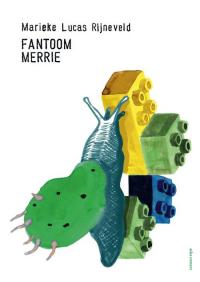 De feestelijke prijsuitreiking in Zutphen op zaterdagavond 14 maart j.l. is geannuleerd vanwege het corona-virus. Op een nader te bepalen moment krijgt Marieke Lucas Rijneveld de geldprijs van 1000 euro en een bronzen beeldje voorstellende Ida Gerhardt overhandigd.
De feestelijke prijsuitreiking in Zutphen op zaterdagavond 14 maart j.l. is geannuleerd vanwege het corona-virus. Op een nader te bepalen moment krijgt Marieke Lucas Rijneveld de geldprijs van 1000 euro en een bronzen beeldje voorstellende Ida Gerhardt overhandigd.
‘Haar overrompelende debuut Kalfsvlies (2015) blijkt geen toevalstreffer’, schrijven juryleden Petra Possel en Arjan Peters in het juryrapport. ‘In lange zinnen, gulle beelden en rijke strofen, hoeft deze dichter ogenschijnlijk niet te zoeken naar woorden; zodra ze gaat schrijven, komen de woorden aan gegaloppeerd.’ Fantoommerrie (2019) zit vol dreigende en onontkoombare taal, aldus de jury. ‘Als een geluid dat steeds tussen je oren suist en maar niet weg wil gaan.’
Fantoommerrie
Auteur: Marieke Lucas Rijneveld
Taal: Nederlands
Paperback
Druk 1
Verschijningsdatum januari 2019
Afmetingen 24 x 17 x 0,5 cm
64 pagina’s
Uitgever Atlas Contact
EAN 9789025453459
NUR code 306
• fleursdumal.nl magazine
More in: Archive Q-R, Archive Q-R, Awards & Prizes, Rijneveld, Marieke Lucas

Chanson
Vos beaux yeux sur ma franchise
N’adressent pas bien leurs coups,
Tête chauve et barbe grise
Ne sont pas viande pour vous ;
Quand j’aurais l’heure de vous plaire,
Ce serait perdre du temps ;
Iris, que pourriez-vous faire
D’un galant de cinquante ans ?
Ce qui vous rend adorable
N’est propre qu’à m’alarmer,
Je vous trouve trop aimable
Et crains de vous trop aimer :
Mon cœur à prendre est facile,
Mes vœux sont des plus constants ;
Mais c’est un meuble inutile
Qu’un galant de cinquante ans.
Si l’armure n’est complète,
Si tout ne va comme il faut,
Il vaut mieux faire retraite
Que d’entreprendre un assaut :
L’amour ne rend point la place
À de mauvais combattants,
Et rit de la vaine audace
Des galants de cinquante ans.
Pierre Corneille
(1606-1684)
Chanson
• fleursdumal.nl magazine
More in: Archive C-D, Archive C-D, Corneille, Pierre
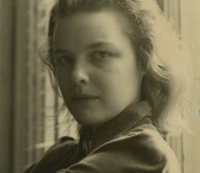
Chrysalis
1
It’s mid-September, and in the Magic Wing Butterfly Conservancy
in Deerfield, Massachusetts, the woman at the register
is ringing up the items of a small girl and her mother.
There are pencils and postcards and a paperweight–
all with butterflies–and, chilly but alive,
three monarch caterpillars–in small white boxes
with cellophane tops, and holes punched in their sides.
The girl keeps rearranging them like a shell game
while the cashier chats with her mother: “They have to
feed on milkweed–you can buy it in the nursery outside.”
“We’ve got a field behind our house,” the mother answers.
The cashier smiles to show she didn’t need the sale:
“And in no time, they’ll be on their way to Brazil or Argentina–
or wherever they go–” (“to Mexico,” says the girl,
though she’s ignored) “and you can watch them
do their thing till they’re ready to fly.”
2
I remember the monarchs my son and I brought in one summer
on bright pink flowers we’d picked along the swamp
on Yetter’s farm. We were “city folks,” eager for nature
and ignorant–we left our TV home–and left the flowers
in a jar on the dry sink in the trailer. We never noticed the caterpillars
till we puzzled out the mystery of the small black things
on the marble top–which turned out to be their droppings.
And soon, three pale green dollops hung from the carved-out leaves,
each studded with four gold beads–so gold they looked to be
mineral–not animal–a miracle that kept us amazed
as the walls grew clear and the transformed things broke through,
pumped fluid in their wings, dried off–and flew.
I gauge from that memory that it will be next month
before the girls are “ready.” I wonder how they’ll “fly”
when there’s been frost. “And they’ll come back next summer,”
the cashier says, “to the very same field–they always do.”
I’m sure that isn’t true. But why punch holes
in our little hopes when we have so few?
3
Next month, my mother will have a hole put in her skull
to drain the fluid that’s been weighing on her brain.
All summer, she’s lain in one hospital or another–
yet the old complainer’s never complained.
In Mather, the woman beside her spent a week in a coma,
wrapped like a white cocoon with an open mouth
(a nurse came now and then to dab the drool).
My mother claimed the woman’s husband was there too–
“doing what they do”–though it didn’t annoy her.
Now she’s in Stony Brook–on the eighteenth floor.
I realize I don’t know her anymore. When she beat against
the window to break through, they had to strap her down
–and yet how happy and how likeable she’s become.
When I visit, I spend my nights in her empty house–
in the bed she and my father used to share. Perhaps they’re
there. Perhaps we do come back year after year
to do what we’ve always done–if we can’t make
our way to kingdom come, or lose ourselves altogether.
Joan Murray
(1917-1942)
Chrysalis
(poem)
• fleursdumal.nl magazine
More in: Archive M-N, Archive M-N, Joan Murray

Le Balcon
Au balcon de l’hôtel, nous étions accoudées.
Et nous avions au coeur, un tel recueillement
Que la nuit et la mer, à nos pieds déployées,
Semblaient venir à nous, silencieusement.
Le ciel était si proche, au fond de l’ombre immense,
Que nos gestes semblaient atteindre l’horizon,
Les vagues se taisaient et, dans le grand silence,
Tout ce que vous disiez prenait un sens très profond.
Et voici que soudain, des voix mystérieuses
Se mirent à chanter sur la mer, devant nous,
Et les unes étaient tendres et douloureuses,
Et d’autres résonnaient comme un rire très doux.
Les voix disaient le charme et la mélancolie
De la belle rencontre et du divin hasard,
Les voix disaient l’histoire obscure de la vie,
L’angoisse des adieux, les larmes du départ.
Ah! qui saura jamais, pourquoi sous ces étoiles,
Les être dans le soir, se seront pris la main,
Au lieu de s’en aller, comme s’en vont les voiles,
Sur les flots, vers des cieux différents et lointains.
J’ai senti contre moi, votre épaule plus chaude,
Le ciel, en pâlissant, faisait vos yeux plus clairs,
Et des parfums marins de sable, d’algue et d’iode,
Se mêlaient aux parfums qu’exhalait votre chair
Emilienne d’Alençon
(1869-1946)
Le Balcon
Août 1917
• fleursdumal.nl magazine
More in: Archive A-B, Archive A-B, d'Alençon, Émilienne
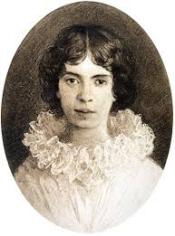
A Syllable
Could mortal lip divine
The undeveloped freight
Of a delivered syllable,
’T would crumble with the weight.
Emily Dickinson
(1830-1886)
A Syllable
• fleursdumal.nl magazine
More in: Archive C-D, Archive C-D, Dickinson, Emily
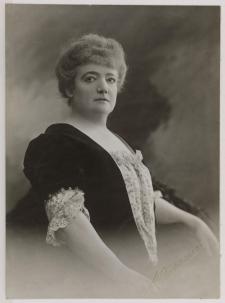
Sérénade printanière
Hier comme aujourd’hui, ce soir comme demain,
Je t’adore !
Quand je vois ton regard, quand je frôle ta main,
C’est l’aurore !
Qui donc nous avait dit que le monde est méchant,
Que l’on souffre,
Que la vie est un pont qui tremble, se penchant
Sur un gouffre ?
Où donc sont les ennuis, les erreurs, les dangers,
Les désastres ?
Avril gazouille et rit dans les tendres vergers
Fleuris d’astres !
Le sombre hiver a fui ; le radieux printemps
Nous délivre.
Viens mêler à mes pleurs tes baisers haletants ;
Je veux vivre !
Nos coeurs sont confondus, nos âmes pour toujours
Sont unies ;
Nous avons épelé le livre des amours
Infinies !
Et je ne vois plus rien que l’éclair de tes yeux
Pleins de fièvres…
Viens ! je veux soupirer les suprêmes aveux
Sur tes lèvres !…
Augusta Holmès
(1847 – 1903)
Sérénade printanière
• fleursdumal.nl magazine
More in: Archive G-H, Archive G-H, CLASSIC POETRY

The Rebel Girl
There are women of many descriptions
In this queer world, as everyone knows.
Some are living in beautiful mansions,
And are wearing the finest of clothes.
There are blue blooded queens and princesses,
Who have charms made of diamonds and pearl;
But the only and thoroughbred lady
Is the Rebel Girl.
CHORUS:
That’s the Rebel Girl, that’s the Rebel Girl!
To the working class she’s a precious pearl.
She brings courage, pride and joy
To the fighting Rebel Boy.
We’ve had girls before, but we need some more
In the Industrial Workers of the World.
For it’s great to fight for freedom
With a Rebel Girl.
Yes, her hands may be hardened from labor,
And her dress may not be very fine;
But a heart in her bosom is beating
That is true to her class and her kind.
And the grafters in terror are trembling
When her spite and defiance she’ll hurl;
For the only and thoroughbred lady
Is the Rebel Girl.
Joe Hill
(1879-1915)
The Rebel Girl
Song
• fleursdumal.nl magazine
More in: # Music Archive, Archive G-H, Joe Hill, Workers of the World

Uit het dagboek van een prinses
Wij weten van dit land dat het bestaat,
en denken van dit volk dat het graag leeft.
Het heeft merkwaardige mensen.
Sommige maken wandelingen van uren
in een draaideur. Andere zwaaien
naar schaduwen. Er zijn er zelfs die lezen.
Ik was in een winkel waar je zomaar
sigaren kunt kopen. In doosjes.
En wat me telkens toch weer opvalt:
Er zijn weinig zwervers zonder hond.
Bert Bevers
Ongepubliceerd
Bert Bevers is a poet and writer who lives and works in Antwerp (Be)
• fleursdumal.nl magazine
More in: Archive A-B, Archive A-B, Bevers, Bert

Lied der Liebe
Engelfreuden ahndend, wallen
Wir hinaus auf Gottes Flur,
Daß von Jubel widerhallen
Höhn und Tiefen der Natur.
Heute soll kein Auge trübe,
Sorge nicht hienieden sein,
Jedes Wesen soll der Liebe
Frei und froh, wie wir, sich weihn!
Singt den Jubel, Schwestern, Brüder,
Fest geschlungen, Hand in Hand!
Hand in Hand das Lied der Lieder,
Selig an der Liebe Band!
Steigt hinauf am Rebenhügel,
Blickt hinab ins Schattental!
Überall der Liebe Flügel,
Hold und herrlich überall!
Liebe lehrt das Lüftchen kosen
Mit den Blumen auf der Au,
Lockt zu jungen Frühlingsrosen
Aus der Wolke Morgentau,
Liebe ziehet Well’ an Welle
Freundlich murmelnd näher hin,
Leitet aus der Kluft die Quelle
Sanft hinab ins Wiesengrün.
Berge knüpft mit ehrner Kette
Liebe an das Firmament,
Donner ruft sie an die Stätte,
Wo der Sand die Pflanze brennt.
Um die hehre Sonne leitet
Sie die treuen Sterne her,
Folgsam ihrem Winke gleitet
Jeder Strom ins weite Meer.
Liebe wallt durch Ozeane,
Durch der dürren Wüste Sand,
Blutet an der Schlachtenfahne,
Steigt hinab ins Totenland!
Liebe trümmert Felsen nieder,
Zaubert Paradiese hin,
Schaffet Erd und Himmel wieder –
Göttlich, wie im Anbeginn.
Liebe schwingt den Seraphsflügel,
Wo der Gott der Götter thront,
Lohnt die Trän’ am Felsenhügel,
Wann der Richter einst belohnt,
Wann die Königsstühle trümmern,
Hin ist jede Scheidewand,
Biedre Herzen heller schimmern,
Reiner, denn der Krone Tand.
Laßt die Scheidestunde schlagen,
Laßt des Würgers Flügel wehn!
Brüder, drüben wird es tagen!
Schwestern, dort ist Wiedersehn!
Jauchzt dem heiligsten der Triebe,
Den der Gott der Götter gab,
Brüder, Schwestern, jauchzt der Liebe,
Sie besieget Zeit und Grab!
Friedrich Hölderlin
(1770 – 1843)
Lied der Liebe
Gedicht
(Zweite Fassung)
• fleursdumal.nl magazine
More in: Archive G-H, Archive G-H, Hölderlin, Friedrich

UN should demand release of jailed
journalists amid COVID-19 pandemic
CPJ is calling on several UN special mandate holders to join its effort to secure the release of all jailed journalists globally in the face of the COVID-19 pandemic. At least 250 journalists are behind bars for their work, according to CPJ’s most recent prison census.
• Committee to Protect Journalists (CPJ) – 11 April 2020
In the midst of the COVID-19 pandemic, the Committee to Protect Journalists calls on governments to release all journalists from their prisons. On behalf of more than 250 journalists behind bars, we call on authorities to free these political prisoners immediately and unconditionally.
For journalists jailed in countries affected by the virus, freedom is now a matter of life and death. Imprisoned journalists have no control over their surroundings, cannot choose to isolate, and are often denied necessary medical care.
The World Health Organization states that “People deprived of their liberty, and those living or working in enclosed environments in their close proximity, are likely to be more vulnerable to the COVID-19 disease than the general population.”
Global press freedom and human rights organizations are calling on world leaders to immediately release all imprisoned journalists. Add your voice to the call and sign our petition today!
The Committee to Protect Journalists submitted a call to several U.N. special mandate holders yesterday encouraging them to join CPJ’s effort to secure the release of all jailed journalists globally in the face of the coronavirus pandemic.
# See here website CPJ’s petition
• fleursdumal.nl magazine
More in: AUDIO, CINEMA, RADIO & TV, MUSEUM OF PUBLIC PROTEST, PRESS & PUBLISHING, REPRESSION OF WRITERS, JOURNALISTS & ARTISTS
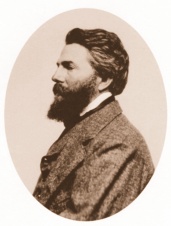
Formerly A Slave
The sufferance of her race is shown,
And retrospect of life,
Which now too late deliverance dawns upon;
Yet is she not at strife.
Her children’s children they shall know
The good withheld from her;
And so her reverie takes prophetic cheer–
In spirit she sees the stir.
Far down the depth of thousand years,
And marks the revel shine;
Her dusky face is lit with sober light,
Sibylline, yet benign.
Herman Melville
(1819 – 1891)
Formerly A Slave
• fleursdumal.nl magazine
More in: Archive M-N, Archive M-N, Herman Melville
Thank you for reading Fleurs du Mal - magazine for art & literature